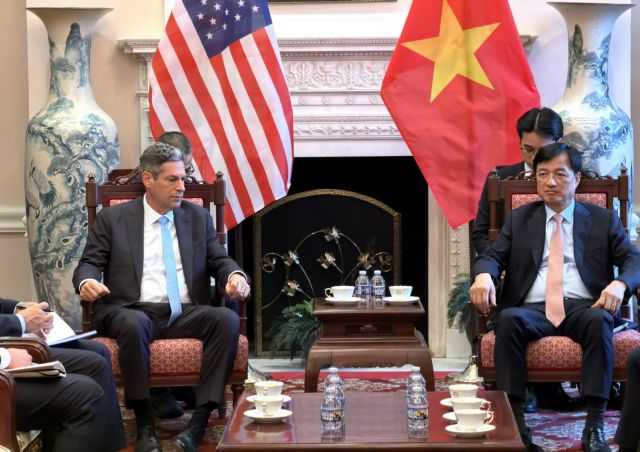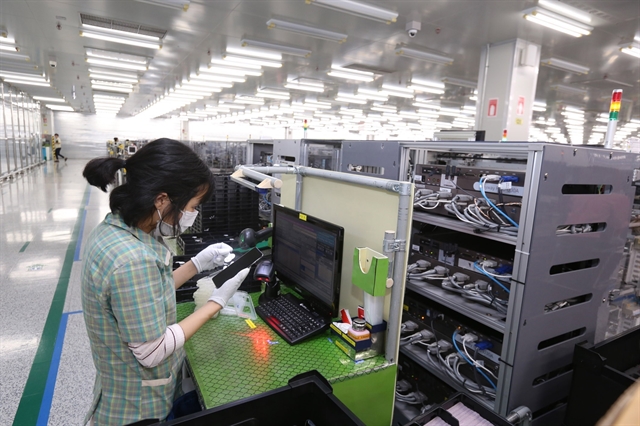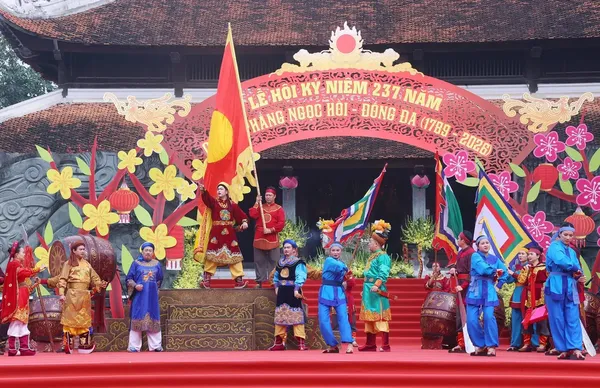 Economy
Economy

 |
| A Vietnamese worker inspects a smartphone in the Samsung factory in Thái Nguyên Province. VNA/VNS Photo Anh Tuấn |
HÀ NỘI — Việt Nam and the Republic of Korea (RoK) have made remarkable progress in cooperation in various fields over the past 30 years, according to Nguyễn Đức Hải, vice chairman of the National Assembly.
Hải was speaking at the 'Korea - Vietnam Economic Cooperation Forum 2022' on Friday.
He said RoK remained Việt Nam's largest partner in foreign direct investment (FDI), the second in official development assistance, and the third in trade. Meanwhile, Việt Nam has positioned itself as the largest economic partner of RoK among ASEAN countries.
By late October, RoK has initiated over 9,400 projects in the country, equivalent to more than US$81 billion of registered capital.
"Việt Nam will create a more favorable investment climate to draw in more foreign investors, especially RoK investors," said Hải.
Trần Duy Đông, Deputy Minister of Industry and Trade, underlined RoK investment as a driving force behind economic restructuring in Việt Nam. Over the past three decades, the destination of investment has shifted from labour-intensive industries to high-tech and high-value-added industries.
"Accumulated RoK investment in Việt Nam and bilateral trade are aimed to reach $100 billion each by 2025," said Đông.
The deputy minister called on RoK enterprises to give investment priority to certain fields, including digital transformation, biology technology, and clean energy, to help Việt Nam move one step closer to its development goals in the short term.
Vũ Tiến Lộc, chairman of the Vietnam - Korea Friendship Association (VIKOFA), said RoK enterprises have made a great contribution to Việt Nam's economic growth by creating jobs and promoting 'made in Vietnam' products globally.
However, more effort is still needed to upgrade RoK investment in the country, laying the groundwork for the deep involvement of Vietnamese small- and medium-sized enterprises in RoK's global supply chains.
"The miracle on the Han River in RoK is an inspiration for the miracle on the Hồng River in Việt Nam in the years to come," said Lộc.
He also said that the next wave of RoK investment in the country should be based on three pillars - innovation, environmental friendliness, and close ties with local enterprises. Without the pillars, ROK enterprises would not be able to take root locally.
Jeong Man-ki, vice chairman of the Korea International Trade Association, revealed that the minimum wage in Việt Nam is ranked 5th in the ASEAN region and is rising rapidly.
He anticipated that in the future, Việt Nam would face stiffer competition from other countries in this regard. One of the major competitors is Indonesia, which saw its FDI in 2022 grow by 40 per cent year-on-year.
"Minimum wage in RoK was 72 times higher than that in Việt Nam in 2009. Now the proportion is seven to one," said Man-ki.
The vice chairman urged Việt Nam to improve its investment environment by introducing favourable policies for companies willing to relocate their factories to the country and by avoiding double taxation.
Bùi Quang Tuấn, director of the Vietnam Economic Institute, remarked that bilateral trade is growing steadily, yet skewed in favour of the RoK. Remarkably, Việt Nam was facing an accumulated trade deficit of $32.8 billion with RoK in 2021.
"RoK should import more Vietnamese goods to improve Việt Nam's balance of trade," said Tuấn.
The director underlined low competitiveness, low productivity, and low level of involvement in global supply chains as the disadvantages that Việt Nam needs to overcome to gain ground internationally.
Member of the National Assembly of South Korea Hong Sung Kook was concerned that in Việt Nam the proportion of the digital sector to the economy is outweighed by that of the realty sector.
"It is not easy for foreign investors to engage in the realty sector," said Kook.
He urged Vietnamese enterprises to embrace green growth to be able to improve their involvement in global supply chains, which have been moving toward sustainable development.
Choi Joo Ho, CEO of Samsung Vietnam, revealed that Samsung Vietnam had drawn up a plan to support local component suppliers in the medium- and long-term.
From 2015 to 2021, the corporation dispatched specialists to 400 suppliers to help them improve their competitive advantages and output capacity. Between 2018 and 2021, the corporation proceeded to help them enhance their human resources.
"Thanks to the support, the suppliers saw its output rise by 40 per cent, its errors fall by 50 per cent, and its unsold inventory drop by 36.4 per cent," said Ho.
From 2022 onwards, the corporation will support them in building smart factories and improving their positions in Samsung's supply chains.
Ko Sang Goo, deputy chairman of VIKOFA, asserted that the influence of the two countries will go beyond Asian borders to become global in the next 30 years.
He said the Roman Empire opened a golden age of Pax Romana in ancient times; the US Pax Americana in the previous century. He believed that the next era would come a period of Pax Asiana, of which Việt Nam and RoK would take the centre stage.
"The two countries will make history in the next 100 years," said Goo. — VNS




